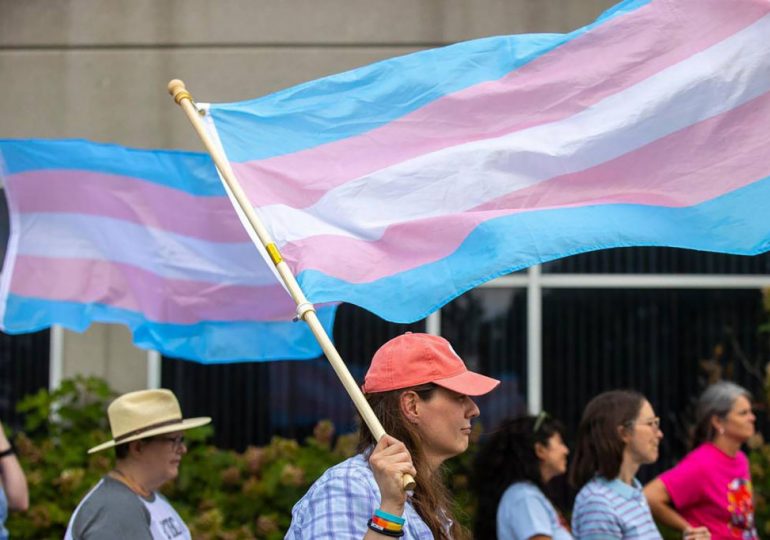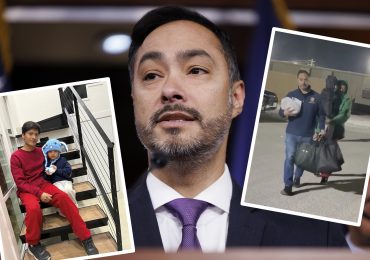For trans youth and their loved ones, this November’s presidential election will be the most consequential in history.
A second Donald Trump presidency would pose not only an existential but a literal threat to vulnerable young people who are already, in many cases, being targeted by their state and local leaders. As spelled out on his own campaign website, Trump’s 2024 promises include a ban on gender-affirming care for minors in all 50 states, along with pulling Medicaid and Medicare funding for any hospital that offers treatments like puberty blockers and hormone replacement therapy to minor patients. Trump also vows to pass a federal law “the only genders recognized by the U.S. government are male and female and they are assigned at birth,” thus erasing the very existence of trans people.
[time-brightcove not-tgx=”true”]
The very real dangers of a Trump presidency are what led me to spend nearly a year traveling the U.S. to talk with trans youth and their families on what everyday life looks like for them. Ultimately, I spoke to seven families of trans youth in seven different states — which ended up becoming a book, American Teenager — and what became clear to me is that trans children often have little in common with each other except for the desire for their elected leaders to let them live in peace.
For trans kids hailing from conservative states, that has too rarely been the case. Wyatt, who was 15 when I visited his family in South Dakota, spent his entire childhood making trips to the state Capitol building in hopes of preventing Republicans from chipping away at his right to exist, sadly in vain. Despite his efforts to lobby against a gender-affirming care ban, testifying at public hearings and meeting personally with lawmakers, the legislation eventually passed in February 2023. By that time, Wyatt was already looking at pursuing ballet school in another state, aware that South Dakota would never return the undying love that he has for his home state. He couldn’t take another heartbreak after years of watching South Dakota betray his affection over and over again.
In the hundreds of hours of interviews I conducted, trans youth voiced a common sentiment: They feel as if their childhoods were stolen from them. All they want is the ability to hang out with their friends, play video games, and go to the mall without worrying that their rights might be taken away. But it’s exactly what conservative politicians themselves have denied them.
Read More: Anti-Trans Laws Linked to Increase in Trans and Nonbinary Youth Suicide Attempts
Growing up in the shadow of anti-trans legislation, to put it lightly, is no one’s ideal of an adolescence. Jack, who was 19 when we spoke, temporarily lost her hormone medication after Florida banned Medicaid coverage for trans youth health care, which was how she accessed her medication. She watched helplessly for five months, until her 18th birthday, as the girl she had come to know withered away, unable to stop it. Jack was deprived not merely of the last days of her childhood, but her very body.
Trans kids and their families are acutely aware that these seemingly unthinkable nightmare situations are exactly what they will be fighting to prevent if Trump is permitted to resume his presidency. That is one of the many reasons trans Americans have fled to one of the 14 states that have enacted shield laws or executive orders protecting gender-affirming medical care. A June 2023 survey from the liberal think tank Data for Progress found that 40% of trans respondents had considered moving because of anti-trans legislation, with 26 states now placing restrictions on trans youth medical care; at least 8% had already done so. Some trans people, fearing that nowhere is safe for them, especially under a Trump presidency, have already fled for more progressive countries like Canada and New Zealand.
The question is not whether these harms would be exacerbated under a Trump presidency, but rather, to what degree. His running mate, Ohio Sen. J.D. Vance, authored a federal bill in Congress making it illegal for doctors to provide gender-affirming care to minors. If signed into law, the “Protect Children’s Innocence Act” would make it a class C felony, punishable by up to 15 years in prison, for a doctor in any state to offer gender-affirming surgery to a patient under the age of 18. This is despite the fact that transition surgeries are seldom performed on trans youth and typically only in cases of acute medical need. When New Hampshire passed a bill earlier this year banning gender-affirming surgeries for minors, proponents of the measure reportedly couldn’t point to a single example of such an operation having ever been performed in the state.
But Trump, emboldened by increased executive authority from the Supreme Court, would be unlikely to stop at restricting gender-affirming care. His platform suggests that his administration will push a “Don’t Say Gay” law banning teachers from addressing LGBTQ+ topics in schools, at the risk of losing federal funding. According to his campaign website, Trump further intends to limit the participation of trans youth in sports, force schools to out trans students to their parents, and push a national law declaring that there are “male and female—and they are assigned at birth.” The latter policy would be a replay of his first term, during which his Department of Education rolled back repealed Obama-era guidance advising K-12 schools to allow students to use restrooms that align with their identities and respect their pronouns and chosen names in class. Showing how far he was willing to go, even then, Trump reportedly had to be dissuaded from issuing an executive order legalizing broad discrimination against LGBTQ+ people.
These policies would make America unlivable for trans kids, many of whom already feel unsafe in their own communities. It’s no coincidence that, after my book was written, both Wyatt and Jack were forced to make a similar decision: moving away from states that don’t represent their best interests. They seem happier — even lighter — in their new environments, and Jack has a boyfriend now and a new job. But the fact is that, depending on who is president in January, there may be nowhere left to move that is truly free. There may be nowhere for them to have the only thing they’ve ever really wanted: the ability to just be themselves.
The choice, then, feels abundantly clear: We can either vote for an America where trans kids thrive or one that continues to make children into refugees in their own country.
Leave a comment








